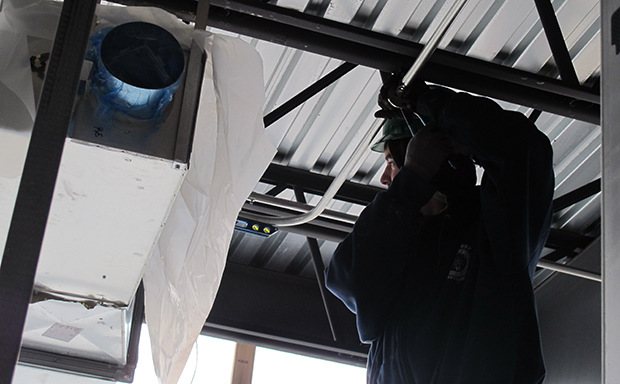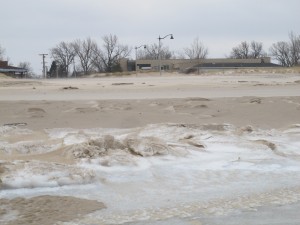After Ball State Revokes Charter, Future Of Gary School's New Building In Limbo

Kyle Stokes / StateImpact Indiana
A worker at the site of a new $13 million building Charter School of the Dunes is constructing in Gary. The future of the school — and the building — are in doubt, however, after Ball State University decided to revoke the school's charter.
Surveying the gray steel skeleton of what’s supposed to be Charter School of the Dunes’ $13 million new home on Gary’s east side, Danielle Sleight says, is both exciting and heartbreaking.
—Bob Marra, Ball State University
That’s because the school — which Sleight helped found ten years ago — may never move in.
Charter School of the Dunes is one of seven Indiana charter schools Ball State University officials will shut down at the end of this school year for what they see as chronic academic underperformance. Leaders of all seven are appealing the decision and should learn their fates by early March.
Two Ball State-sponsored schools also withdrew applications to renew their charters, meaning more Indiana charter schools could close this year — a total of nine — than have been closed down in the since the state’s charter law passed.
- Was Charter School's Closure Overdue Or Premature?StateImpact Indiana‘s Kyle Stokes visits a Gary charter school now facing closure just six months before the completion of their new $13 million home.Download
“I’ve been doing this for over ten years and to get to this point and then all of a sudden for someone say, ‘Yeah, no, sorry you’re done.’ I can’t tell you how devastating this is,” Sleight says.
Ball State officials say the decision shouldn’t come as a surprise to any of the schools whose charters they’re revoking. Bob Marra, who runs the university’s Office of Charter Schools, says they made their reservations about the charters’ academic performance clear in meetings with school leaders.“We delivered the message that there were serious concerns about their data and they weren’t meeting their performance goals as outlined in their charter,” Marra told StateImpact.
School administrators at Charter School of the Dunes, though, say Ball State officials’ decision to shut them down did catch them off guard. Leaders of three other schools facing closure echo their sentiments.
“They say I shouldn’t be [surprised],” said Dunes principal Christine Pepa, who figures the F the school received under the state’s grading system played a role in Ball State’s decision. (Ball State says the decision was based on more than the letter grade.)
“Like I’ve explained over and over again, it’s not just a grade — you should be looking at the entire school,” not just a school’s test scores, Pepa says.
Building ‘Quandary’
Charter School of the Dunes currently leases a cramped city building on the windy shores of Lake Michigan. But the city plans to level the building as part of a beachfront renovation project. So school officials broke ground last summer on a new home two miles inland.

Kyle Stokes / StateImpact Indiana
Charter School of the Dunes subleases space in a city building on the frozen shores of Lake Michigan. The school quickly outgrew the building, a former military training center, and now leases several temporary trailers.
Administrators at Charter School of the Dunes acknowledged the new building project came with risk. As Dunes’ school leaders wrote in their charter renewal application to Ball State University:
The Board needed to make a decision to either build on the land purchased nine years ago while working on our charter renewal or wait for the decision of our charter renewal and risk being without a building for our students. With this quandary in front of them, the Board decided to build with the understanding that if our charter were not renewed, the Board would sell the new facility.
The renewal process wouldn’t be cakewalk, Pepa says. Like the other six charter schools facing closure, Charter School of the Dunes’ standardized test scores trail both state averages and the local school district.
41 percent of the school’s students passed both the math and reading portions of the ISTEP last year. That’s up from 28 percent two years ago. By comparison, the statewide ISTEP pass rate was 71 percent in 2012.
But Pepa says 85 percent of the students who enrolled in the school this year came in below grade level. She says it takes time for a school to catch these students up.
“With what we provide here and the documents that we gave [Ball State], we think we showed a strong case of why the school deserves to be open,” Pepa says.
Sympathy For Families, But Not Poor Performance
—Christine Pepa, Charter School of the Dunes
“I recognize that,” Marra says. “They view it through their child’s lens.”
Charter schools are judged on different terms than other public schools. Indiana law allows charter school operators to avoid many of the regulatory burdens placed on traditional school districts.
But as we’ve reported, it also gives broad powers to those overseeing charters schools to shut schools down — especially if they’re not meeting performance goals the schools’ leaders spell out in their charter proposals.
“What we were trying to look at — I think the most important thing — is that these schools said to us in their proposal, ‘We’re going to meet these goals and objectives.’ If they’re not meeting those standards that they set out, then that’s reason for non-renewal. It’s in the best interests of the student,” Marra says.
Greg Richmond, the president of the National Association of Charter School Authorizers, backs Marra. Ball State officials approached Richmond’s organization to help the university’s Office of Charter Schools revamp its accountability policies.

Kyle Stokes / StateImpact Indiana
Parents pack into a large common room in the back of Charter School of the Dunes on a recent Thursday night. They’re here to watch student presentations — but the charter situation is clearly on everyone’s minds.
“They came to Ball State saying they knew how to run a good school for exactly these kinds of kids — for kids who didn’t have another good school to go to,” says Richmond.
Children With Nowhere Else To Go?
“Nobody went to Ball State proposing to start a school that would fail the kids in it,” Richmond continued. “The kids in a lot of these communities need better options and the charter school idea was put forward as a way of getting these kids better schools. I get very frustrated when the people who then start those schools start giving the exact same excuses about failure that we’ve heard for decades now.”
Pepa and Sleight point to Charter School of the Dunes’ larger-than-average population of special education students. They dispute the characterization that the school’s staff is “failing” its students.
“I will put my staff up against any other staff in the nation,” Pepa says, “and I know that they are working extremely hard to make sure these children are getting the best education possible. We work with children that other people don’t want, so to speak.
“We have special ed parents,” Pepa adds, “who brought their children here because their child had too many disabilities for the other schools and they just didn’t want them. She said, ‘Will you take them?’ We said, ‘Absolutely, we’re a public school.'”
Podcast: Play in new window | Download

